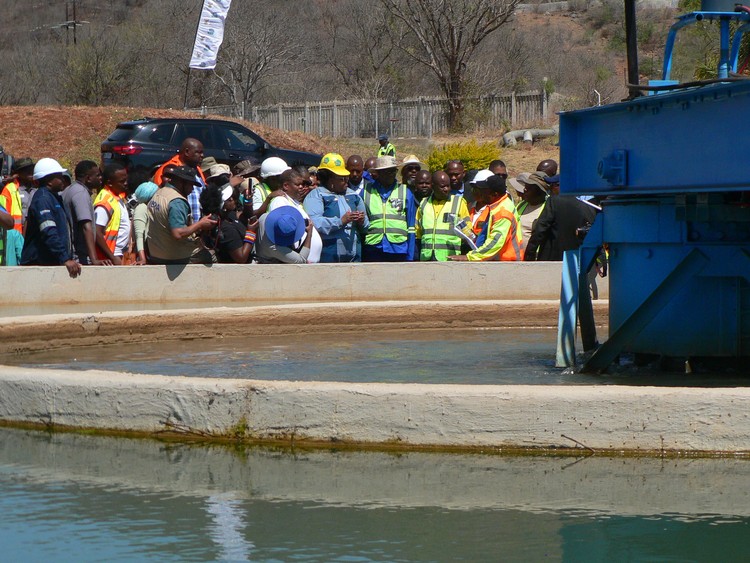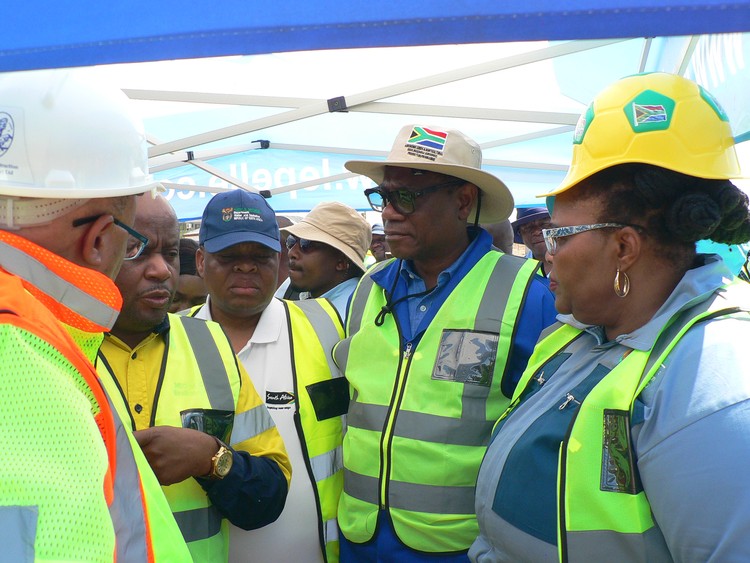Only nine of 55 villages get water from controversial multi-billion rand project
Deputy President Paul Mashatile promises that by November a dozen more villages would get tap water via the Giyani Water Project
Minister of Water and Sanitation Pemmy Majodina and Deputy President Paul Mashatile went with a delegation to visit the Giyani Water Project in Limpopo on Friday. The project has been marred by delays and controversy for several years now. Photos: Bernard Chiguvare
- Minister of Water and Sanitation Pemmy Majodina and Deputy President Paul Mashatile led a delegation to visit the Giyani Water Project on Friday.
- The bulk water project started in 2014 and was meant to be completed by 2017. But it has been marred by controversy and failure despite an estimated spend of R4-billion.
- The project was resuscitated in 2021 and, once completed, is expected to supply water to 55 villages in Giyani.
Only nine of the 55 villages in Giyani, Limpopo, get their water from the Giyani Water Project, according to Deputy President Paul Mashatile.
“We got reports that the other villages will get water within two years. But we would like to speed up the process,” said Mashatile.
He was visiting the Giyani Water Project with Minister of Water and Sanitation Minister on Friday to assess progress at the project. Mashatile is the chairperson of the special task team established to address water challenges across the country.
While there has been progress, many villages within the Giyani area are still struggling daily to access tap water.
The bulk water project started in 2014 and was meant to be completed by 2017. But it has been marred by controversy and failure despite an estimated spend of R4-billion. The project was resuscitated in 2021 and is expected to supply water to 55 villages in Giyani.
The Special Investigating Unit (SIU) instituted a liability claim against three Lepelle Northern Water (LNW) board executives for a R1.9-billion loss suffered by the Department of Water and Sanitation as a result of the tender irregularities involved in the Giyani Water project.
The SIU found that the contract was irregularly awarded and litigated to have the contract declared unconstitutional, invalid, and set aside. Other findings included that the supply chain management processes by LNW board were flawed and contrary to legislation.
On Friday, Minister Majodina announced that investigations into allegations of fraud and mismanagement of funds at the project were still ongoing. She also said they were still looking into the claim that water from the project was being diverted by a farming company.
“The project was delayed due to alleged fraud but as investigations continue we decided to unblock the project so that residents get water,” said Majodina.
Meanwhile Mashatile promised that by November, 24 villages could be getting water from the Giyani project. Asked when other villages would get water, Mashatile said “Soon”. As a measure to ensure that work on the Giyani water project is progressing, Mashatile committed that two water department officials would remain in Giyani to monitor progress.
But some residents criticised the visit by the ministers, saying it would not have any impact on the water crisis in their communities.
“I do not think the visit will bring any change to the community,” said Rhulani Zita from Matsotsosela village. He said many people in his village still buy water and those who cannot afford to buy, fetch water from polluted rivers.
Mashatile and his delegation also visited Nhwakhuwani village, one of the villages now receiving water. GroundUp spoke to several residents who confirmed that they started receiving water a couple of weeks ago but the supply was still inconsistent. “We have to keep our drums full in case the water stops,” Francis Tshabalala told GroundUp.
Water Minister Pemmy Majodina and Deputy President Paul Mashatile talking to officials about progress at the bulk water project.
Support independent journalism
Donate using Payfast

Don't miss out on the latest news
We respect your privacy, and promise we won't spam you.
Next: Health department misses another deadline to provide nurses with uniforms
Previous: Woman in wheelchair narrowly escapes death in Dunoon shack fire
© 2024 GroundUp. This article is licensed under a Creative Commons Attribution-NoDerivatives 4.0 International License.
You may republish this article, so long as you credit the authors and GroundUp, and do not change the text. Please include a link back to the original article.
We put an invisible pixel in the article so that we can count traffic to republishers. All analytics tools are solely on our servers. We do not give our logs to any third party. Logs are deleted after two weeks. We do not use any IP address identifying information except to count regional traffic. We are solely interested in counting hits, not tracking users. If you republish, please do not delete the invisible pixel.


